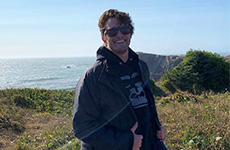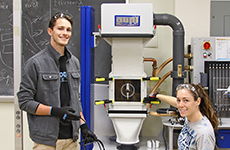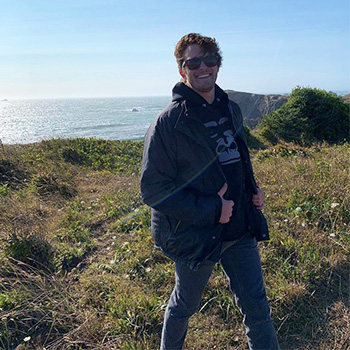Jimmy Fera '17
energize the future.
Jimmy Fera
Hometown: Toms River, N.J.
Class Year: 2017
Major: Sustainability with a concentration in Energy


After choosing to energize the future five years ago, Jimmy Fera has blossomed in his field. Read more to see how his shift to renewable energy is going and why he's glad to have been an Energy graduate.
Jimmy Fera (2017)

Why did you choose Stockton?
Stockton is close to home, so commuting is beneficial. Stockton is known as New Jersey’s Green University which appealed to me because I’m interested in environmental science.
Why did you choose your major?
I chose Sustainability because I liked that the interdisciplinary degree involves being knowledgeable in many different subjects including environmental science, ecology, chemistry, biology, physics, economics, and policy and law. I chose to concentrate in Energy because I had an engineering background and enjoyed the idea of combining engineering with environmental science.
What does your typical day-to-day look like?
My title currently is Sustainability Consultant. I mostly consult on new construction projects for low-rise and mid-rise multifamily buildings, but I also occasionally work on rehabs along with high-rise buildings or single-family homes. I consult on programs such as ENERGY STAR for Homes, LEED for Homes, and similar programs to LEED such as NGBS (National Green Building Standard) and EGC (Enterprise Green Communities).
It’s a mix of both office and field work. Office work includes: project applications; plan reviews; project checklists; support documentation; submittal reviews; and energy modeling. For field inspections, I mostly perform insulation and air sealing inspections during construction. Once construction is complete, I conduct performance testing which includes blower door testing for air filtration, duct leakage testing, and ventilation testing. We also verify other checklist requirements throughout construction depending on which programs the project is pursuing.
Since COVID-19 upended many lives, we wanted to give you the opportunity to reflect on your life pre-and-post-2020. What’s different about your career/field now?
I was living and working in Connecticut for three and half years. Before the COVID-19 quarantine hit, I was commuting to the Norwalk, Connecticut office while living in a suburb of Norwalk with a couple of coworkers (including a fellow Stockton Energy grad; there are now a handful of Stockton Energy grads working for the company).
I started working from home in Connecticut when COVID-19 hit. We didn’t have to go
to the office, but I still had to do field inspections since construction didn’t necessarily
stop in some areas. I started wearing a mask in the field and then when we were doing
testing, we asked them to keep the units vacant and leave the windows open for a while
before we performed our final testing.
After living in Connecticut for a few years, I knew that I wanted to move somewhere closer to my family in New Jersey. COVID-19 gave me the motivation to make that move happen sooner, and working remotely made me realize that I could probably work remotely from another location outside of CT. I decided to move to Philadelphia so that I would be a short drive from my mom and sister while living in a fun city (even though it was during COVID and not the best time to move to a densely populated city).
My company was kind and accommodating enough to allow me to keep my job after the move. I was still remotely supporting projects that I had in Connecticut but I started only helping out in the field with projects within a one- to two-hour drive of Philadelphia. I’m very lucky and grateful that it all worked out for me."
What is your next goal? Do you see yourself coming back to the nest or another university for graduate school?
I’m going to Rowan University for a Master’s in Electrical and Computer Engineering starting in the Fall of 2022. My undergraduate degree was a Bachelor’s of Science in Sustainability with a concentration in Energy, but I had started my undergrad in Engineering and ever since I have wanted to go back to finish a degree in Engineering. I’m hoping to transition into renewable energy and smart grid technology. I’m planning on doing research there and finishing my degree within a year and a half to two years. I would have gone back to Stockton for my graduate degree if it wasn’t so far of a commute from me now and if they had the program I am pursuing.
What advice would you give students who are interested in sustainability and energy? Are you open to mentoring students currently in the program?
The program really prepared me and gave me a leg up in the hiring process; Professor Patrick Hossay has done a great job developing the curriculum and getting us the actual field experience that employers are looking for.
We performed energy audits in class using the field equipment, we performed energy modeling, and we learned the principles of building science.
Of course, a lot of the training for your role is done on the job, but they’re looking for students with even a little experience outside of the classroom so they can dive in quicker than those applicants without any experience. Even getting the certificate or taking a class with Prof. Hossay would be valuable in this field.
And absolutely; I’d be happy to mentor students currently in the program. I try to stay in contact with Professor Hossay and I’ve had a few students reach out to me already.



